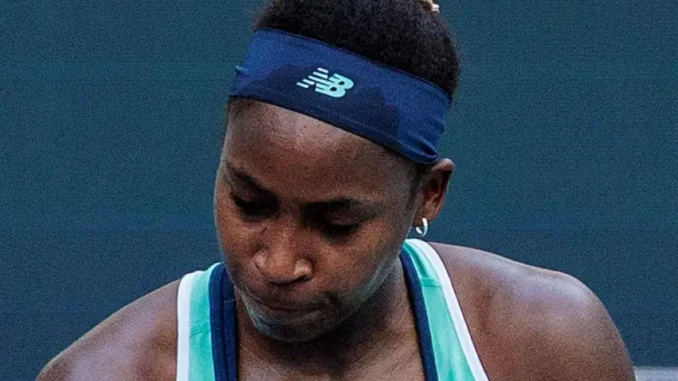
In the fiercely competitive arena of professional tennis, where every swing and stumble is magnified under the global spotlight, Coco Gauff finds herself at a crossroads. The 21-year-old American phenom, once hailed as the heir apparent to Serena Williams, has hit a rough patch in 2025 that’s sparked concern among fans and drawn sharp scrutiny from a German WTA legend. After a string of uncharacteristic losses, including a disheartening second-round exit at the Charleston Open, Gauff’s game—particularly her mounting double faults—has become the talk of the tennis world, with one former champion pointing the finger squarely at her coaching team.
Gauff’s latest stumble came against France’s Varvara Gracheva, ranked No. 66, in a match that ended 6-2, 6-0—a scoreline that stunned onlookers given Gauff’s pedigree. The world No. 6, who started the year with a bang by winning titles in Beijing and Wuhan, managed just one victory in her last four matches, a skid that’s seen her double-fault count soar to an alarming 30 across those outings. Against Gracheva, she coughed up nine double faults, a glaring chink in her armor that turned a winnable match into a rout. “Something is not right with Coco Gauff right now,” the German icon observed, her words cutting through the post-match chatter like a backhand down the line. “She’s got all the tools—power, speed, smarts—but these double faults? That’s a coaching issue. They’re not fixing the fundamentals.”
The critique comes from a figure who knows a thing or two about winning—someone who once ruled the WTA with an iron grip, amassing Grand Slam titles and a reputation for precision. Now 55, she’s turned her analytical eye to Gauff, suggesting that the young star’s team, led by veteran coach Brad Gilbert, has let her down. “Her serve has regressed,” the legend remarked. “You don’t go from dominating in Asia to this kind of collapse without someone dropping the ball. The coach needs to step up—she’s too talented to be faltering like this.” It’s a bold claim, one that’s ignited debate about whether Gilbert, who guided Gauff to her first Grand Slam at the 2023 US Open, is still the right fit as she navigates the pressures of her prime.
Gauff’s 2025 season had promised so much. After a rocky 2024 that saw her part ways with Gilbert briefly before reuniting, she roared back with a vengeance, clinching two WTA 500 titles in October and cementing her status as a top contender. Her forehand, once a liability, had sharpened into a weapon, and her athleticism remained unmatched. But the cracks began to show in March. A fourth-round loss to Jessica Pegula at Indian Wells hinted at trouble, followed by a Miami Open exit to Caroline Garcia. Charleston, a tournament where she’d reached the quarter-finals the year prior, was supposed to be a rebound. Instead, it became a magnifying glass on her struggles.
The double-fault dilemma isn’t new—Gauff has long battled inconsistency on her second serve—but its resurgence is baffling. In her title-winning runs late last year, she’d tamed the issue, averaging under four per match. Now, it’s ballooned to nearly eight, a statistic that’s not just a number but a narrative of lost points and shattered confidence. Against Gracheva, each wayward toss seemed to sap her momentum, her body language shifting from poised to perplexed. Fans watching courtside murmured about tension, while online chatter echoed the German legend’s sentiment: something’s off, and it’s more than just a bad day.
Gilbert, a former player turned coaching guru, has been a polarizing figure in Gauff’s camp. His brash style and strategic acumen lifted her to that US Open triumph, but critics argue he’s failed to evolve her game beyond its current ceiling. The German WTA icon didn’t mince words: “A coach’s job is to build consistency, especially on serve. If she’s double-faulting this much, they’re not doing enough in practice—or they’re not addressing the mental side.” It’s a stinging rebuke, one that raises questions about whether Gauff needs a fresh voice to unlock her next chapter.
Yet, amid the criticism, there’s hope. Gauff’s talent is undeniable—her speed, her fight, her ability to turn defense into offense. At 21, she’s still young, with time to iron out the kinks. Her post-match reflection hinted at self-awareness: “I know what I need to work on. It’s frustrating, but I’m not giving up.” The clay season looms, with the French Open—where she’s twice been a finalist—offering a chance at redemption. For now, though, the spotlight burns hotter than ever, and the tennis world waits to see if Gauff and her team can silence the doubters, one serve at a time.
Leave a Reply